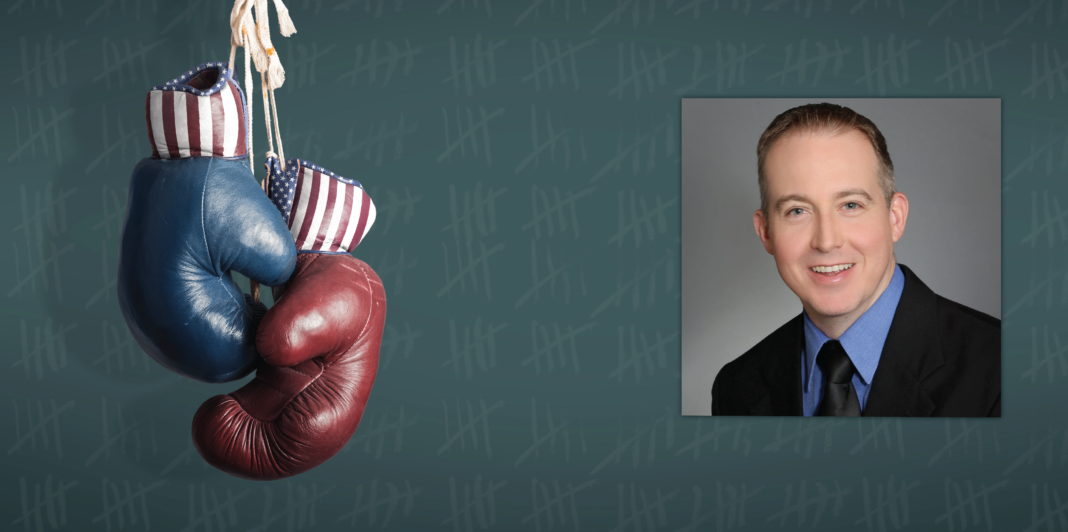From the Montgomery County Republican Chairman: What is a Liberal?
I’m proud of my son who is an active officer in the Civil Air Patrol program along with his good friend—we’ll call him Conner. It’s a good hour drive each way to their meetings each week and it gives me an opportunity to hear what’s going on in their world. Most of the conversations revolve around typical teenager stuff like video games, the latest Marvel movie, or schoolwork. Occasionally their conversation will turn toward the world of politics as it did just the other night.
As Conner was sharing his school assignments with my son, he mentioned that he was tasked with defining the term “liberal”. He found it confusing that the word appears to convey “liberty” or “freedom”, yet the label applied in the political realm seems to mean the very opposite—and of course he’s not wrong.
If you dive into the etymology of the word “liberal”, you will find that in the 1800’s its Old French heritage is “befitting a free people”. Around the 16th century it would have been understood as meaning “free from restraint in speech or action.” Nevertheless, applied to modern politics it seems to convey the very opposite—restriction, restraint, and government intrusion. How can this be? In our two-party system politicos are often characterized as conservative or liberal. Perhaps the only party immune to this contradiction is the often-forgotten Libertarians? Or perhaps there is something else not immediately obvious?
In the most proper sense, we are a two-party system. However, when we really start to put these parties under the microscope, we find something very different. Within the Republican party we find essentially two parties. One faction, where I find myself would agree with Ronald Reagan who said:
“If you analyze it I believe the very heart and soul of conservatism is libertarianism. I think conservatism is really a misnomer just as liberalism is a misnomer for the liberals — if we were back in the days of the Revolution, so-called conservatives today would be the Liberals and the liberals would be the Tories. The basis of conservatism is a desire for less government interference or less centralized authority or more individual freedom and this is a pretty general description also of what libertarianism is.”
The Blind Men Grasping at the Elephant: Analyzing the wings of the Republican Party
Within the Republican Party there are two wings. On the left wing of the GOP, we find Republicans that are more apt to align themselves with “Big Government”. There are many names that we can call them, or that they have been called by Republicans in the past. Rush called them RINOs, Mark Levin calls them Establishment Republicans, in the early modern political era (1950s-1970s) they were called liberal Republicans. At the conclusion of the Second World War, an intellectual movement began within the more Conservative Wing of the Republican Party. Intellectuals like Friedrich Hayek, Ayn Rand, Leo Strauss, Richard Weaver, Russell Kirk, and William F. Buckley Jr. began to craft the ideological elements of the modern Conservative movement. While the movement started slowly, the conservative wing would eventually overshadow the liberal wing of the Republican Party.
Pin the Tail on the Donkey:
I think the same dichotomy can be found within the Democrat party. Within their party are the “Blue Dog” Democrats which favor social conservatism but embrace big government. On the other end of the spectrum, you have the Progressives. These are the radical, woke mob cultures that want to destroy the nuclear family and replace it with something less.
Suffice it to say, that both major political parties have what we would loosely call a liberal wing, and a conservative wing within each respectively, and neither one accurately describes the party in general.
So how did we get here and how do we reconcile the contradiction?
The Republican Party was founded in 1854 primarily as an Abolitionist Party from what was left of the Whig Party. Lincoln became the first Republican President, and upon news of his election, the Civil War began. In the aftermath of America’s deadliest war, Republicans dominated the political scene in both the North and South for the next twelve years following the end of the Civil War.
A new brand of Republican emerged at the turn of the Century. With the assassination of McKinley, Theodore Roosevelt became President. Teddy was a Progressive Republican. Progressive political ideology stood (and stands to this day) against the founding belief of Natural Rights, and Natural Law. Progressivism rejects the idea of Separation of Powers, Limited Government, and favors the “rights of the Collective” over the rights of the individual. For the first twenty years of the Twentieth Century, the US would be governed by a Progressive President, in fact, two of the three of these were Republicans.
As the political winds shifted in America, Progressivism fell out of favor. The term was no longer politically viable to run under its banner for either party. When Franklin D. Roosevelt (Teddy’s cousin) ran as the Democratic nominee for President in 1932 he ran as a “Liberal” but instituted Progressive Policies that Teddy, Taft, and Wilson could only dream of in the preceding years. FDR called the blanket title of the policies “The New Deal”.
From the Great Depression onward, Liberalism was anchored to “Big Government Programs” but due to the need to fight Fascism during WWII it was also at the same time defined by classically liberal ideas such as freedom of speech, or freedom of religion, etc. This also explains how there were members of the Republican Party that fell under this descriptor as well. There were Republicans that stood in the way of big government, and those that embraced it. Following WWII every Republican President would fall into this category. Eisenhower, Nixon, and Ford all were “Liberal Republicans”.
By the 1970’s however New Deal Liberalism was dying out. Conservative Republicans began to gain more strength within the Republican Party. The nomination of the GOP candidate for President in 1976 came down to the RNC itself. While the delegates in the end nominated Gerald Ford over Ronald Reagan, after his concession speech on the floor of the RNC it was clear to everyone in the room that they had nominated the wrong candidate. Four years of economic disaster followed, and Reagan won two landslide elections in 1980, and in 1984, with the GOP turning every State in the Union except Minnesota red in the 1984 election.
However, after two blockbuster terms in office, the GOP was unable to field a Conservative Republican Candidate in his wake. Both George H.W. Bush, and his son George W. Bush were much more in line politically with the “Liberal Republicans” that dominated the GOP prior to Reagan. McCain, and Romney were even more so in 2008 and 2012 respectively. Even Donald Trump was not as conservative as Reagan had been in the 1980s on many economic policies.
What is a Liberal?
Answering the question of “What something is” is essential but understanding “How” and “Why” is more instructive. The etymology of the word liberal is the same used to describe liberty. Language changes and evolves over time; therefore etymology is a useful science. Democrats during the New Deal hijacked and changed the term forever for their own political expedience. The modern term resembles nothing of what it once did. While there are still some FDR style liberals in the Democratic Party, people like Senator Joe Manchin of West Virginia, or political commentator Bill Maher, most of the Democratic Party have become outright Leftists. These Neo-Jacobins seek nothing short than the complete destruction of our beloved republic. Perhaps with this in mind, the Republican Party can finally embrace the appropriate term “Conservative”.
Bryan Christ is the Chairman of the Republican Party of Montgomery County Texas. Scott Wingerter is a historian who holds a Master’s Degree in US History from Sam Houston State University, and is the host of the political podcast Impolite Company produced by Dock Line Studios.





















